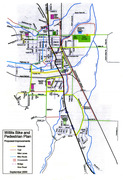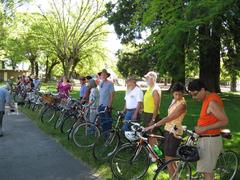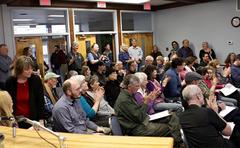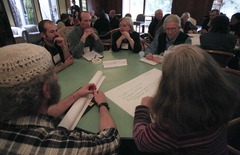Well Overview
- Details
- Created: Monday, 08 December 2014 17:40
- Last Updated: Wednesday, 07 March 2018 20:20
Oil is a finite resource, and by some estimates, is declining rapidly. This will mean dramatic changes in the way we as individuals and as a society function. Oil provides not only fuel for our vehicles and power plants, but also plastics, pesticides, fertilizers, pharmaceuticals, etc. Hydrogen, an often-touted replacement fuel, still has a myriad of problems to overcome, including energy efficient production, transportation and storage. As oil begins to grow more expensive, the potential for our society to continue commuting long distance to work or play will be the first to go, followed by deliveries of consumable products and then, essential products (both manufacturing and delivery of the same).
Beginning in October of 2004, Dr. Jason Bradford began showing the film 'The End of Surburbia' to those interested in the Willits Community. Interest grew and after several showings, the seeds of WELL began to develop, drawing a diverse cross section of the community into its folds.
From this diverse group, the primary objectives for WELL became
* Determining the current resource use in the community of Willits, California (energy, transportation, food, housing, etc.),
* Examining how the community can reduce its consumption of those resources imported,
* Visualizing local resources that can replace those imported from outside the community and
* Implementing this transition towards a localized economy.
At foremost issue is the coming decline of petroleum resources and the impact it will have on all of us. The goal is to find creative methods to sustain and empower the local community while moving away from global (imported) resources -- in essence, to 'localize' our community.
Mission
The mission of Willits Economic LocaLization (WELL) is to foster the creation of a sustainable, local economy based on the principles of sufficiency, responsibility, and life promoting actions.
WELL is made up of a network of citizens and community organizations that meet regularly to create a common vision, foster education, plan work, and carry out projects.
Why 'Economic Localization?'
WELL provides a positive vision that runs counter to many disturbing trends in our society.
Few people have control over basic necessities in their lives. Multinational corporations don't care about our town. Distant government agencies don't know what we need. Being dependent on non-renewable resources from politically unstable parts of the world threatens our security. As responsible adults, we'd rather face reality and do what is necessary to avert catastrophic climate change, mass extinction of species, and the loss of democratic freedoms.
Although some are galvanized by perceived threats, many have also realized that the process of localizing our economy gives us an opportunity to focus on our shared values and develop friendships. We find ourselves building a stronger, more caring community. We are seeking creative ways to become economic partners with each other and our environment. The goal is to find creative methods to sustain and empower the local community while moving away from global (imported) resources -- in essence, to 'localize' our community.
Economic localization is necessary to enhance our security, the responsible way to organize an economy, takes advantage of our ingenuity, and builds a thriving community.
How does WELL function?
WELL organizes regular community meetings and special events that educate, empower, and build social networks that spin off into tangible projects. We usually gather at the Willits Community Center on alternate Mondays from 6:30 to 8:30 pm. Watch the Events Calendar for when the Co-ordinating Committee meets.
WELL was initiated in Oct. 2004 when Dr. Jason Bradford organized screenings of "The End of Suburbia" and then asked the attendees, "What should we do now?" It is currently governed by a Coordinating Committee of 10 people operating on an 80% consensus rule. (Read a description of the first several months of WELL).
During its first year, WELL was run by volunteers and financed through small donations. In partnership with an existing local non-profit organization, The Renewable Energy Development Institute and the Post Carbon Institute, WELL shared an office and a half-time staff person. In the summer of 2006 WELL members created and adopted formal guidance documents including a governance document, a membership document and a one-year strategic plan. You can view those documents here: WELL Guidance Documents.
In 2007 WELL had matured enough as an organization to seek a more direct non-profit status. Earthmind, a non-profit corporation deeply involved in renewable energy, conservation, and sustainable living from its inception in the early1970’s up to its dormancy in the late 1980’s, was revitalized and took on WELL as a Program with the goal of fully merging WELL and Earthmind into a single legal entity. WELL also received a generous grant from the Wallace Global Fund which allowed WELL to expand its office hours and function while giving more tangible support to the many projects in the Willits area that are localizing the economy.
What has WELL done?
WELL has focused initially on gathering data on local resources and issues, bringing in experts, developing a common vision, and informing our community through various media.
While these activities are ongoing, WELL has also helped spawn projects that form the bridge between our current reality and our desired future (e.g., community garden and gleaning club). WELL does not officially own, operate or control any project, but simply creates the place where ideas, plans, and group feedback are available to initiate and keep projects on track.
What do we know about the Willits area?
WELL is focusing attention on the 95490 zip code, which includes about 322 sq miles in the middle of Mendocino County, CA. About 13,500 people live here.
We emit about 10 tons per person per year of carbon dioxide and spend about 30 million dollars on imported energy sources. We eat about 12 billion food calories per year. Our grocery stores have daily deliveries by truck from distribution centers in the Sacramento Valley and the San Francisco Bay Area. The in stock food supply of our stores would last less than a week. Our hospital sends its laundry for service out of the county and has a 3-day supply of diesel fuel in case of grid failure. The City's biggest use of energy is to pump water out of our reservoir and get it treated. Our municipal water storage tanks would last us a few days or so.
The heart of our area is the Little Lake Valley, which was once used to feed local citizens. Fortunately, the valley is not all paved over and could feed us again. We have abundant sunshine in the summer and many small creeks flow steadily in the winter. Renewable energy has good potential here. Willits has long attracted those with a pioneer spirit, a sense of adventure, a willingness to change, and creative energy. And as exemplified by WELL, we are also warm-hearted, tolerant, and supportive of each other.
In a Nutshell
Who are we?
We are citizens of the Willits region, working together to plan for the future of our town.
Why are we here?
To create social networks and empower our community to make changes that enable healthy, secure, and fulfilling lives.
Why are we doing this?
We are dependent on a global economy that depletes resources and damages ecological systems. Many of us desire a simpler life, more in tune with our neighbors and local landscapes.
What should be done?
We need to create a local economy based on the principles of sufficiency, responsibility, and life promoting actions. Ultimately, it is about ensuring clean water, high quality food, renewable energy sources, ecological shelter, and meaningful livelihood. This healthy environment results from communities where the values of good work, tolerance, and shared responsibility are ingrained in the population. And these communities result from individuals with the vision and courage to make the changes that align their lifestyles with these values.
How can this be done?
We offer a place where those of us ready to make this individual change can join forces. We meet (often) to envision a plan for our future, exchange information and ideas, and encourage each other in our work. Many of us also meet during the week to plan events and help each other with localization projects.
How can I become involved?
We invite you to join us and help wherever you can. If you have an interest In food, energy, transportation, social issues, housing, publicity, research, art, etc., you will find a niche in WELL.
Where can I learn more?
Watch the schedule on this website for upcoming events you may be interested in. We have offices in downtown Willits at the REDI office. Call us at (707) 459-7076 to Leave a voice message, or see our Contacts Page If you are local, check the Willits News for articles and listen to the local radiostation KZYX&Z for announcements.
Joint Statement Towards A Sustainable Healthy Willits
The City of Willits was the first group to sign a statement calling for a local and sustainable economy. Many others have followed. Read the statement here, and if you are from Willits or the surrounding region, please have your organization sign this too! Download the joint statement below.
Attachment Size
JointStatement.pdf 7.89 KB























